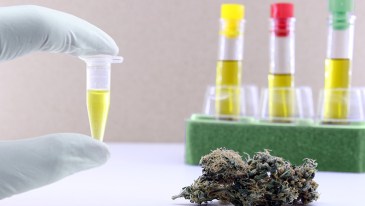
Legislation unanimously passed by members of the US Senate empowers the US Attorney General to facilitate clinical research trials involving cannabis. The action represents one of the very few occasions that members of the Senate have ever advanced a marijuana-related reform bill.
Senate Bill 253: The Cannabidiol and Marihuana Research Expansion Act provides the office of US Attorney General, rather than the US Drug Enforcement Administration, the discretion to license scientists to engage in clinical trials involving the use cannabis by human subjects. Under this proposal, the AG is also provided with the ability to authorize increases the total number of federally approved marijuana cultivators. The Attorney General is provided with a 60-day timeline to either affirm or reject applicants for licensure.
Under current regulations, the Drug Enforcement Administration is primarily tasked with reviewing and licensing marijuana cultivators, as well as granting Schedule I licenses to scientists wishing to study cannabis in clinical settings. In 2016, the Agency announced that it would expand the pool of federally licensed growers beyond just the University of Mississippi (which was initially granted a federal cannabis cultivation license in 1968). In May, the agency for the first time ever announced that it had reached agreements with a handful of third-party applicants to allow them to grow cannabis for use in federally approved clinical trials.
For decades, scientists wishing to work with marijuana have complained that it often takes years before their research protocols are approved by the DEA, and that the quality of cannabis provided by the University of Mississippi’s cultivation program is of inferior quality and that it is not representative of the products available in state-legal markets.
Senate members in 2020 passed a similar version of S. 253 in the final weeks of the legislative session. Their action came days after House members passed more expansive legislation, The Medical Marijuana Research Act, which sought to facilitate clinical cannabis research by permitting authorized scientists to access flowers and other products manufactured in accordance with state-approved marijuana programs – thereby bypassing the need for researchers to access marijuana grown by DEA license-holders. A new version of this Act, House Bill 5657, is pending in the US House of Representatives, but it has not yet been advanced out of committee.
NORML has long advocated for amending federal regulations so that federally-licensed scientists can directly access and assess the wide variety of cannabis products readily available in medical-use and adult-use state markets.
“Rather than compelling scientists to access marijuana products of questionable quality that are manufactured by a limited number of federally licensed producers, NORML believes that federal regulators should allow investigators to access the cannabis that is currently being produced by the multitude of state-sanctioned producers and retailers throughout the country,” NORML’s Deputy Director Paul Armentano said. “Doing so will not only facilitate and expedite clinical cannabis research in the United States, but it will also bring about a long overdue end to decades of DEA stonewalling and interference with respect to the advancement of our scientific understanding of the cannabis plant.”
The full text of S. 253 is online here. Additional information is available from NORML here.

